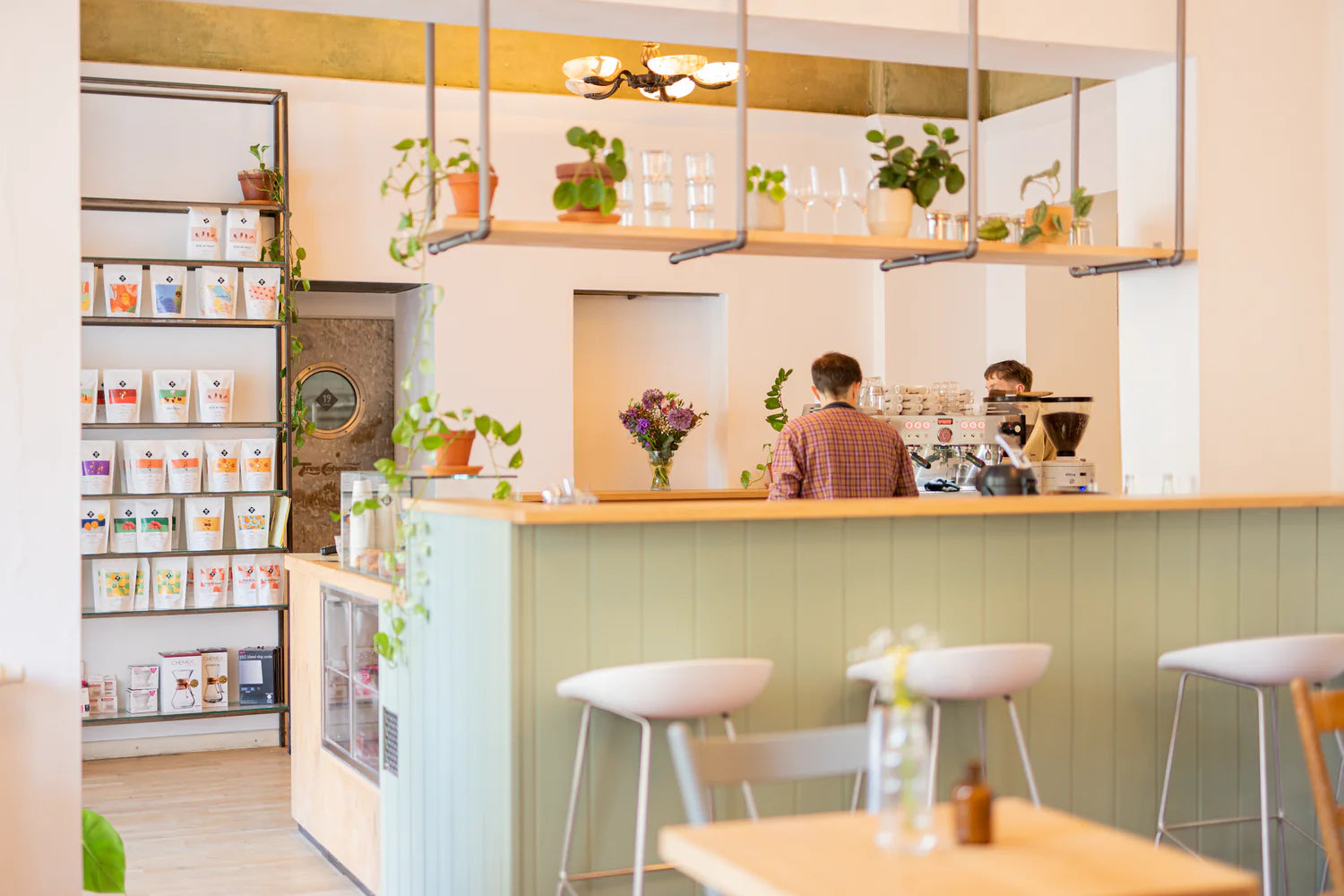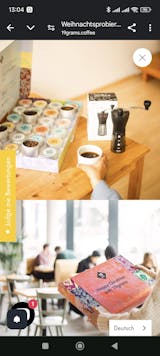In this second article in our series on the sustainability of 19grams, we look at our cafés and how we are working to serve our bloody good coffee in an environmentally conscious way. Our four cafés in Berlin are the flag carriers for our brand, and besides representing our ideals in coffee, food, and service, they also promote our best practices on sustainability.
First and foremost, our cafés strive to serve bloody good coffee. The two key ingredients are coffee beans and milk. We’ve taken steps to ensure that these make it to our cafés in the most sustainable way possible.
Freshly roasted coffee is delivered weekly to our cafés from the roastery in large reusable plastic buckets. These buckets are airtight, which keeps the coffee in them fresh, and are used to store coffee in the shops before it is used. When a bucket is emptied, it’s sent back to the roastery with the next delivery to be washed out and then reused. This means we can deliver coffee Berlin-wide, including to our wholesale partner cafés, in a zero-waste loop.
Our cow’s milk is supplied by the Ökodorf Brodowin, a local biodynamic agriculture group who make all their produce to the Demeter standards. They’re located in Barnim, in Brandenburg, just outside Berlin, reducing the distance the milk has to travel before being used. The milk comes either in recyclable bags made out of a special plastic, called Calymer, which minimise the amount of plastic used per litre; or in reusable glass bottles that are returned with the next delivery. The biodynamic focus at Brodowin means that we can serve high quality, unhomogenised milk with full confidence that it is being produced in a sustainable and humane way. And it’s delicious.
For our plant-based friends, we use oat milk from Oatly. They’re a Swedish brand that produces many dairy alternatives from oats, and their milk designed for coffee is massively popular. Oat milk is one of the most sustainable milk alternatives, using up to an eighth of the amount of water compared to almond milk, for example. It’s also great from an allergens perspective.
Oatly have long been sustainability proponents, for example running campaigns advocating EU-wide listing of products’ CO2e per kilo, which would better allow consumers to compare the sustainability of products with a numeric measure. However, they have also drawn criticism since they accepted a $200 million investment from Blackstone, a controversial private equity firm with alleged ties to the fossil fuel lobby, Amazonian deforestation and the global housing crisis. Critics have questioned how Oatly can reconcile this with their green values, and accused them of enabling green washing. In their defence, Oatly argue that by showing establishment investors like Blackstone that companies can be green and profitable, they can change the path of investment for the better.
It’s a complex debate, and ultimately up to individuals to decide if they support Oatly. For us, we’ve been using Oatly for years now and have many customers who still prefer it to other milk alternatives. For now we’re sticking with it, but remain on the lookout for alternatives, especially for a locally produced, Berlin-based product.
Table service and take away
We love seeing our customers’ smiling faces in our cafés, not only because they are beautiful people, but because it means that we can serve them coffee in our ceramic cups, which get washed and used again and again. We encourage people to take a seat and take a moment to enjoy their coffee.
Sometimes you’ve got to run, so we’ve put a lot of thought and effort into how we serve out take away coffees. Our take away cups are made from 100% paper, making them recyclable in the normal paper bin. This is in contrast to most take away cups, which have a plastic lining that makes them impossible to recycle. It’s also a better disposal method, as paper recycling is the most readily available and means the cups can go back into the loop, unlike for example biodegradable cups which just decompose in landfill.
Because we have not yet been able to find a lid provider that makes similarly recyclable paper lids, we have decided to not use lids in our cafés for the time being. We think making things easy to recycle is an important part of sustainable packaging, and requiring lids and cups to be put in separate bins is an unnecessary step that leads to more cups ending up in landfill.
If you’re clever, you can bring your own cup and enjoy a 50 cent sustainability discount on each take away coffee. A keep cup, a cup made from old coffee grounds, a glass jar from your pesto last night, a cheesy mug your granny gave you: whatever you got, we’ll put bloody good coffee in it.




